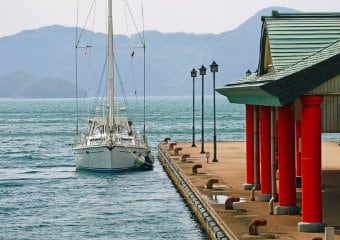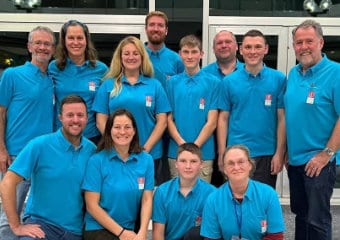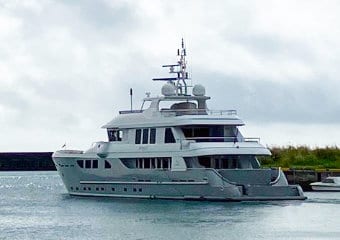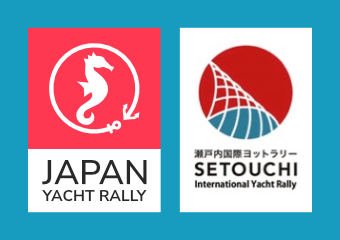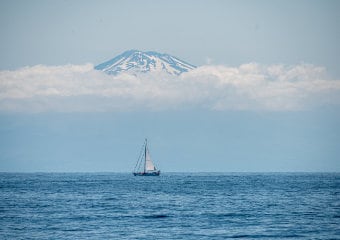In the October 6 edition of "Kirk's Take," I discussed how to moor in Japanese fishing ports. In this edition, I will discuss some of the unique aspects of Japanese marinas and how to make the most of them.
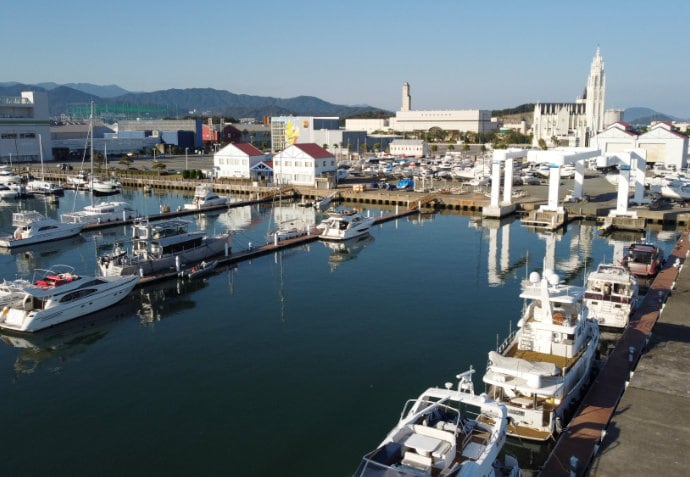
Nishifukuoka Marina Marinoa, Fukuoka Prefecture
General Information
There are about 100 marinas in Japan that welcome visiting boats. They range from small 20-boat marinas to mammoth facilities accommodating 1,400 boats, from small day cruisers to superyachts. They are located throughout the country, with the largest concentration being in the Seto Inland Sea. They are generally well built and well managed, with friendly, helpful staff who do their best to satisfy visitors' needs.
Most of the marinas that offer visitor moorage are registered as Umi-no-Eki (Sea Stations), so that website is the easiest way to find a marina. Note, though, that the Japanese website offers much better, and more updated, marina information, than the English website.
One difficulty, though, is that few marina staff can speak English, so it is almost impossible to call a marina to make a reservation unless one can speak Japanese. It is better, therefore, to send a simple, clearly phrased email requesting moorage, a haul-out, or repairs. Even then, though, it is not unusual for marinas to ignore English-language emails because they can't read them or are unable to write a reply. In that case, one just has to show up and hope for the best – most marinas usually have an empty spot or two for an unexpected arrival.
Most marinas are closed one day a week, usually Tuesday or Wednesday, so one should schedule one's arrival to avoid the weekly holiday.
Capacity and Facilities
Most marinas can accommodate visiting boats up to about 40'. Beyond that, as the boats get bigger the number of marinas that can handle them gets smaller, with 50' being a common cut-off size. There are only a few marinas that can accommodate boats over 60'. Like in other countries, catamarans have a tougher time finding marina moorage.
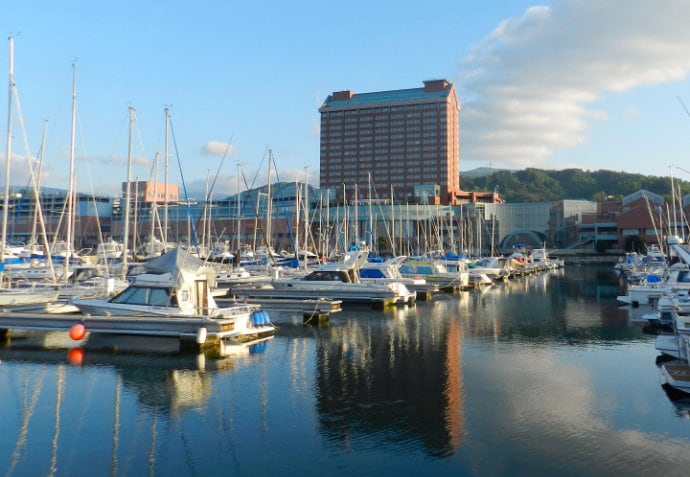
Otaru Marina, Hokkaido Prefecture
In terms of facilities:
- water is available at the dock in almost all marinas, either for free or for a very modest price;
- shore power (30 and 50 amp) is usually available, often for quite a reasonable fee; a variety of plugs are used, though, and so marinas often can lend or rent a compatible plug/cord or adapter if necessary;
- marinas have toilets and showers in the club house and sometimes washers/dryers;
- free Wifi is generally available in the club house, but the signal rarely gets to the docks.
Cost
Some cruisers say that Japanese marinas are expensive, but they seem to have marinas in developing countries in mind when they say that. Compared to most developed countries, Japanese marinas are moderately priced, and sometimes cheap. Of course, as elsewhere, it depends a lot on the size of the nearby city: The bigger the city, the more expensive the marina, so Tokyo/Yokohama marinas are much more expensive than those in smaller cities (having said that, the best marina in Yokohama is cheaper than the best marina near, for example, Los Angeles). Marinas along the highly urbanized Tokyo-Nagoya-Osaka corridor are most expensive, with marinas in western Japan generally being quite reasonable. In Fukuoka (population: 1.6 million), for example, I paid US$430/month, compared to US$500/month at my home marina in Victoria, Canada (population: 400,000).
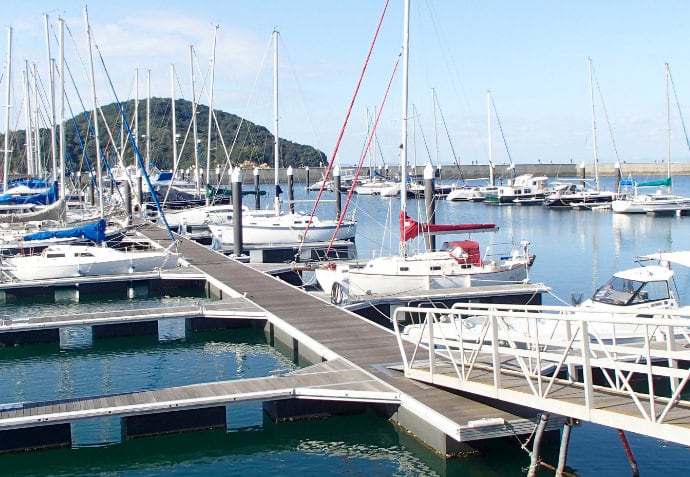
Nio Marina, Kagawa Prefecture
Safety
Unlike in many countries, marinas in Japan are incredibly safe and secure, not because of the marinas themselves but because the entire country is incredibly safe and secure. In the six years that I cruised Japan, I never once locked my boat, even when I went back to Canada for a few months, and nothing was ever stolen (although sometimes people would leave presents of beer, sake, fruit, and local delicacies in the cockpit).
Long-term Moorage
Many marinas limit visiting boats to one-week stays, which poses a challenge for those looking for long-term visitor moorage (such as the many people who cruise Japan for six months and then leave their boat in Japan while they go home for the winter, returning to continue cruising in the spring). There are, however, a handful of marinas that do accept long-term visitors (with some even providing special moorage rates), while also satisfying such important criteria as being well-protected from both typhoons and winter winds, having reliable service staff, being reasonably convenient to transportation links, and not being too expensive.
Storing one's boat on the hard, however, is not an option in Japan. Although many (perhaps most) local boats are kept on land, that is not an option for visiting boats because land-storage means putting the boat in a customized cradle that is owned or leased by the owner (stands are rarely used in Japan, mainly because of the typhoon risk). Marinas do typically have a few cradles of various sizes for use when doing repairs/maintenance on boats, but they are not available for long-term storage (and, in any case, many marinas do not have cradles that are large and strong enough to handle the bigger, heavier boats favored by foreign cruisers; it might be possible, though, to find a long-term storage cradle for a boat under 35').
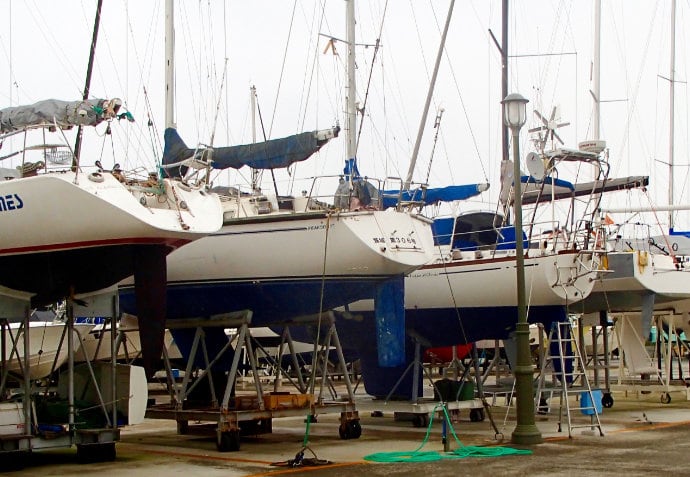
Land storage at Oarai Marina, Ibaragi Prefecture
Miscellaneous Comments
Finally, a few miscellaneous comments about marina services.
- Most (but not all) marinas have fuel docks, although it is generally cheaper to get fuel delivered to your boat by a gas-station truck when moored in a fishing port.
- Most (but, again, not all), marinas have haul-out facilities, but – as with moorage – they can generally only handle a boat up to about 40', and only a few can handle boats over 50'. Almost none can haul out catamarans, but some marinas can bring in a construction crane to do the job.
- The quality of repair and maintenance services at Japanese marinas is, as a generalization, very good, but not great. The mechanics are honest, conscientious, and competent, but they are often generalists and so lack the degree of specialization required to tackle especially challenging jobs. Charge-out rates, though, are about one-half of those in other developed countries.
In short, Japan has a wide variety of high-quality marinas to meet the moorage and service needs of foreign cruisers.
To learn how Konpira Yacht Services can help you enjoy the wonders of Japan's oceans, please feel free to contact us for more information.

